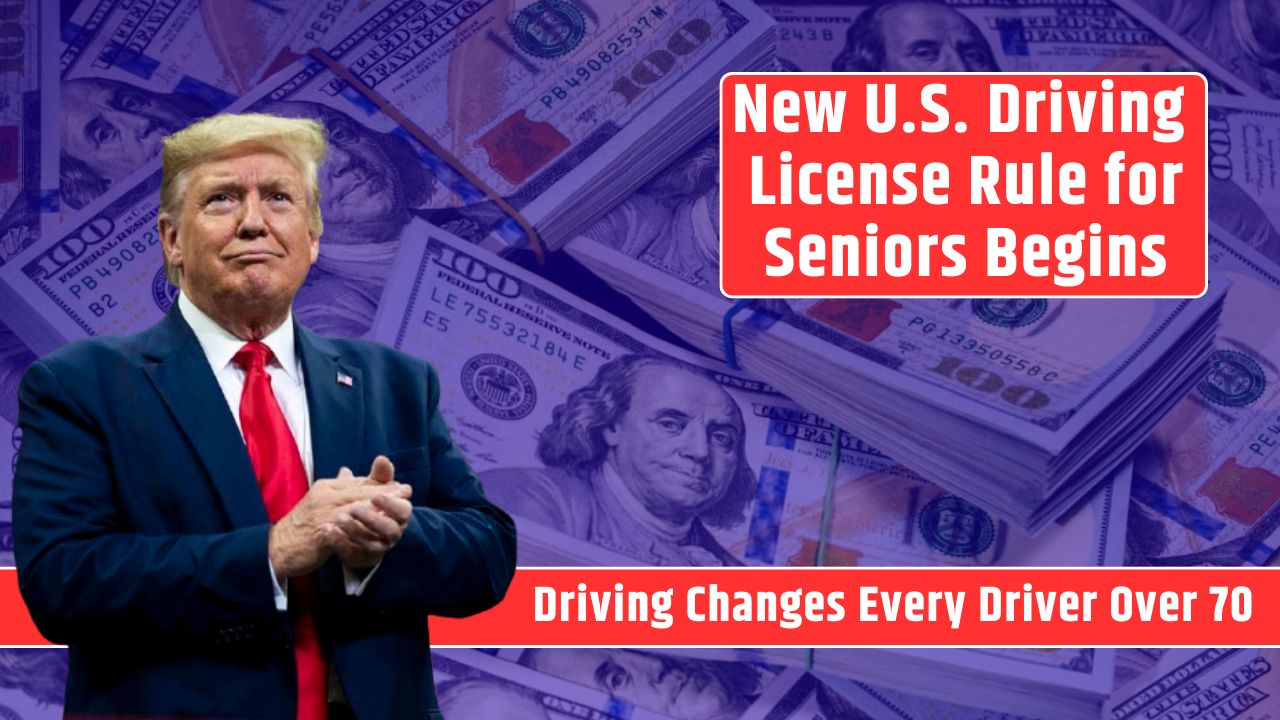Driving isn’t just about mobility — for millions of older Americans, it’s about freedom. The independence to grab groceries, visit grandkids, or just take a spontaneous drive down a familiar road. But that sense of autonomy is now meeting a wave of new U.S. state regulations designed to keep roads safer for seniors and everyone else. The shift is subtle but significant: shorter renewal periods, in-person tests, and more health screenings for anyone over 70.
So, what exactly is changing — and why now?
New Age-Based License Renewal Requirements
Across several states, drivers over 70 are facing shorter renewal windows. Younger motorists might renew every eight or ten years, but for older adults, that period is shrinking to just three to five years in many places.
The reasoning? Health and reflexes can change fast as we age, and regulators want to ensure vision, alertness, and medical fitness stay in check. States like California, Florida, Illinois, and Texas are already enforcing shorter renewal cycles.
| State | Renewal Frequency (Age 70+) | Testing Required |
|---|---|---|
| California | Every 5 years | In-person vision test |
| Florida | Every 6 years (vision at 80+) | Vision exam |
| Illinois | Every 4 years (age 75+) | Written + road test |
| Texas | Every 2 years (79+) | In-person renewal |
| Arizona | Every 5 years (65+) | In-person renewal |
In-Person Renewal Is the New Normal
Gone are the days of easy online renewals for older adults. Once you hit 70 (or in some states, 75), you’ll likely need to show up in person at your local DMV office. Expect a short vision screening, maybe a written or road test, and possibly a doctor’s note confirming you’re fit to drive.
For some, it’s a hassle. For others, it’s reassurance — a system designed not to take away keys but to keep drivers confident and competent behind the wheel.
Stricter Vision and Medical Screening
Vision, reaction time, and cognitive clarity are at the heart of these new measures. If you’re managing conditions like glaucoma, diabetes, or mild cognitive decline, you may be asked for a fitness-to-drive statement from your physician.
In some states, the DMV can even initiate a review if police or family members flag safety concerns. It sounds intimidating, but as safety advocates note, early detection of problems can prevent tragedies — not just for older drivers but for everyone on the road.
Road Testing Returns — for Some
If you’ve had multiple recent accidents, failed a vision test, or raised red flags during renewal, a road test could be required. Think of it as a practical check — not a punishment.
And while nerves are understandable, these tests often serve as confidence boosters. Many seniors report that once they pass, they feel reassured knowing they’re still sharp behind the wheel.
Why States Are Tightening the Rules
Here’s the big picture: the U.S. now has over 30 million licensed drivers aged 70 and above, per Federal Highway Administration data. That number’s expected to surge as baby boomers continue driving longer than any generation before them.
While experience gives older drivers an edge, slower reflexes and vision issues can increase risks. The new rules strike a careful balance between safety and freedom — allowing seniors to stay on the road while ensuring the system spots problems early.
The Impact on Older Drivers
For seniors, driving isn’t just transportation. It’s a lifeline. Losing that independence can feel like losing a part of oneself. That’s why these new requirements have stirred mixed feelings — relief for some, anxiety for others.
Those living in rural America, where buses and rideshares are scarce, could find in-person renewals especially burdensome. Still, there’s an upside: more frequent eye exams and medical reviews mean potential health issues get caught sooner, sometimes even before they affect driving.
Staying Ahead of the Curve
If you’re nearing 70, the best move is preparation.
- Visit your state’s DMV website for the latest renewal timelines.
- Get your eyes checked annually.
- Keep your medical records updated and accessible.
- Brush up with a senior driving refresher course.
Groups like AARP Driver Safety even offer online and in-person programs designed specifically for older motorists.
Tech Is Becoming the Co-Pilot
Here’s the good news: technology is making driving safer for everyone — especially older adults. Cars equipped with automatic braking, blind-spot alerts, lane departure warnings, and adaptive cruise control are helping fill in the reflex gaps that come with age.
Meanwhile, state DMVs are exploring digital tools — apps that remind seniors of renewal deadlines or allow pre-screening of documents — making compliance a little less stressful.
Family Matters: How Loved Ones Can Help
If you’re the child or caregiver of an older driver, these new rules might feel like a cue to start that tough conversation about driving ability. Approach it gently. Ask questions instead of making declarations. Offer alternatives — rideshares, community transport, or shared errands.
Driving is deeply personal; losing that privilege can feel like losing autonomy. Empathy goes a long way.
Will Insurance Rates Shift?
Possibly. Insurance companies assess both age and driving record, so these stricter testing systems might eventually lead to lower premiums for seniors who maintain clean records and pass medical exams. Conversely, missed renewals or flagged issues could nudge rates up.
Keeping your paperwork — and your health — up to date is the easiest way to stay in good standing with insurers.
FAQs:
Are medical exams always required?
Not always. It depends on state policy and any conditions noted during renewal.
Do all states require in-person renewal for seniors?
No, rules vary. Some states like California and Texas do, while others allow mail renewals up to a certain age.
What happens if I fail a vision test?
You may be asked to see an eye specialist and submit updated medical certification before your license is renewed.





















